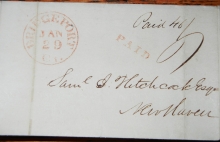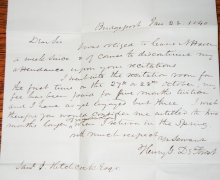Year:
Letter is from Henry G. DeForest noting that: "I was obliged to leave NHaven a week since & of course to discontinue my attendance upon your recitations. I went into the recitation room for the first time on the 27th or 28th October. My fee has been paid for five months tuition and I have as yet enjoyed but three. I wish therefore you would consider me entitled to two months longer (of yr instruction) when I return in the Spring." With much respect, yr servant, Henry G. DeForest. The letter is addressed to Samuel J. Hitchcock. Further research is needed regarding the writer. Letter is in excellent condition with no tears. Manuscript Paid #6 (for senders box) and 5 rate. Full red postmark. Samuel Johnson Hitchcock was the son of Benjamin and Mary [Johnson] Hitchcock. He was born the oldest of twelve children. Since his father had very little money for his education, Hitchcock was first trained as a mechanic. However, he had a great love of reading and education and attracted the attention of his pastor, the Rev. Azel Backus who helped prepare him for college. He graduated as the valedictorian of his class at Yale in 1809. After attending the Litchfield Law School, he worked as a tutor at Yale for the next four years until he resigned in 1814 and consequently passed the bar in New Haven. In 1815 he entered practice in New Haven. His first wife, Laura Coan, died fourteen years after they married from contracting consumption. They had five children. His second wife, Narcissa Perry Whittemore, died eleven years after they married while on a trip to Southport. In 1820, Hitchcock became associated with Seth Staples as a teacher in his private law school. He divided his time equally between his legal practice and his teaching. Hitchcock and Staples were instrumental in the founding of the Law School of Yale College. Staples moved to New York City in 1824, and left Hitchcock in charge of his law school with Judge Daggett who assisted him in his teaching. From 1824 until his death, teaching at the law school was his most important job. That same year, Yale began to publish names of law students in its annual catalogue of students. Two years later Daggett was named a Professor of Law by Yale, even though Yale did not award a Bachelor of Law degree until 1843. In 1830, Hitchcock was made an instructor in law by Yale, even though his law school still remained separate. However, in 1846, a formal act of the Yale Corporation made the law department a branch of the college. Hitchcock was renowned by his students as an effective and inspiring teacher, whose lectures were often attended by many students of disciplines other than law. He often used examples from history and literature in his classes. From 1837 to 1840, he was the President of the Hartford and New Haven County Railroads. He received an honorary degree from Yale in 1842. At the time of his death in 1845, he was working to establish a railroad between New Haven and Albany.


